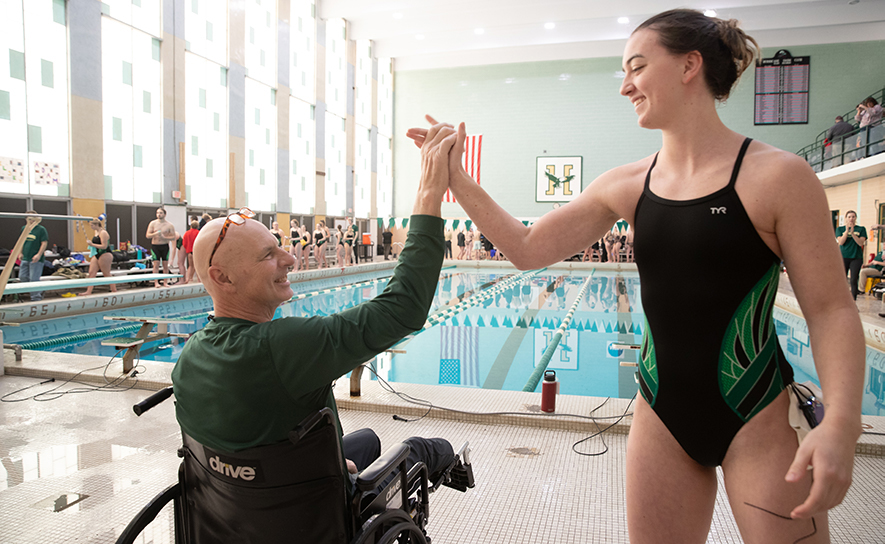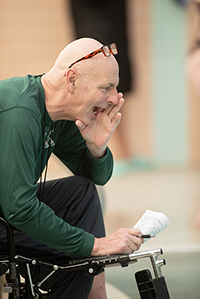USA Swimming News
After Quadruple Bypass and Leg Amputation, Maine Swim Coach Butch Babin Remains on Deck

Photo credit: Monty Rand Photography
If you were to ask individuals in the swim community of Bangor, Maine who taught them how to swim, you are more than likely to hear the name Butch Babin. As an age-group coach at Hurricane Swim Club and collegiate coach at the town’s Husson University, Babin has established his roots on pool decks in and around the community for years.
After growing up an age-group swimmer and becoming an official at 18, his passion for the sport was quickly expanding. While he took awhile away from the sport to pursue other career opportunities, Babin would come to realize that his passion in life still remained on the pool deck.
Then, in the mid-1990’s, Babin got back into the sport. This time, as a coach.
It was at the local Bangor YMCA where he quickly rediscovered his passion for the sport and for coaching. Now, over two decades later, Babin still feels fulfillment when working around the Bangor swim community
“Not everybody is Michael Phelps,” Babin explained. “Their goals have to be realistic to them, and I want to coach to that aspect of them— focusing on what I can do to help them reach their own goals.”
Over the span of the last four years, Babin’s coaching has taken a different shape following an improbable string of medical events that put his coaching career on pause time and time again. It all started with a slip on a pool deck that resulted in doctors finding issues with his heart upon examination. A few months later, another pool-deck slip resulted in a broken hip and femur bone. Fast forward another handful of months, and a team road trip was halted by a minor car crash which flung Babin forward, re-breaking the same hip that had just healed.
While these setbacks all resulted in time away from the pool, Babin recovered and made his way back on deck. Though things seemed to be returning to normal, they quickly took a serious turn.
Upon arrival at the hospital for a small-scale coronary stent operation for his heart condition, doctors quickly switched gears when they found him in immediate need of a quadruple bypass—an open-heart operation that requires four separate artery bypasses in order to get blood to the heart.
The operation was successful, resulting in weeks of recovery before he could return to coaching.
“That was a pretty long process,” Babin said. “To come back from that, it was pretty tough. And I probably came back [to the pool deck] too soon. I just hate disappointing people, and I felt like I owed it to my swimmers and their parents, but I probably came back too soon from that.”
Babin, now three bone breaks and an open-heart surgery deep into his four-year medical rollercoaster, was back coaching his age group and collegiate teams. For a man who endured so much physically, a simple cut on his foot a year after his heart surgery seemed miniscule in the moment, but when it later turned into a serious fever, he returned to the hospital thinking he had the flu.
When he arrived, doctors uncovered that his fever wasn’t a result of the flu, but rather a bacterial infection from that “miniscule” cut on his foot. The bacteria had started growing throughout his right foot, and doctors did everything they could to try and stop the spread.
“[The bacteria] pretty much ate my foot,” he explained. “They tried taking some of it out, but that didn’t work. They tried taking a little bit more out, and that still didn’t work.”
After multiple efforts to remove the infected areas, a decision was made to amputate Babin’s foot to try and stop the infection. Following a successful operation that left Babin without his right foot, doctors expected the spread to deteriorate and eventually dwindle out. However, another examination showed that the bacteria was continuing to grow through Babin’s right leg despite having already lost his foot. Eventually, doctors decided to amputate his leg just below the knee to stop the spread.
While many could look at three broken bones, an open-heart surgery, a bacterial infection and multiple amputation operations as a way to escape and take some time away from work and their ordinary lives, that wasn’t in the cards for Babin. Once he was cleared by the doctors, he made his return to the pool late in 2019— not standing, but rather seated in a wheelchair— on the deck he calls home.
“I feel better when I’m at the pool, no matter if it’s with my age group team or my college team,” he explained. “I was in the restaurant business for 30 years working my tail off and never got the satisfaction that I do from coaching. I don’t care if our kids aren’t breaking records, but to see kids do their personal best and see kids swim who didn’t think they could, that is what excites me.”
Today, Babin continues to coach at Husson University, while his age-group club unfortunately remains out of water due to COVID-19. Following an extended time coaching in a wheelchair, Babin now stands tall in a prosthetic leg designed by the Massachusetts Institute of Technology (MIT), allowing them to receive data on how much pressure is being exerted and how the prosthetic ankle is reacting.
The prosthetic leg brings a new chapter to his medical journey, but it also brings a sense of regularity to the job that he loves.
“It’s difficult no matter what you do,” Babin explained about having a prosthetic leg. “But having my leg back makes if feel like how it was before. There are some challenges, but they’re not nearly as [difficult] as they were before.”
The difficulties of his four-year medical journey weighed heavy at times, but it was his family and swim community that helped him every step of the way. Whether it was his girlfriend helping with day-to-day tasks, or a swim parent coming over and widening the doors in his house to fit his wheelchair, his support group helped him realize how lucky he was.
“I went through about a two-week period where there was a lot of anger,” he explained. “After that two-week period, I just said ‘you know, it could be worse.’ I never really had a chance to get too negative because of the people around me. Whether it was coaches, parents or swimmers, people would just come and see me out of the blue. I know it sounds cheesy but to me, that gave me a warm feeling to know that people care about me and that people genuinely mean it when they ask, ‘what do you need.’”
Through everything, Babin said his biggest takeaway was that he now knows how quickly things can change and how truly important a strong support group can be. Though he now puts on his prosthetic leg before he puts on his whistle and grabs his practice plan, Coach Babin remains the same passionate swim coach that Bangor, Maine has always known.

